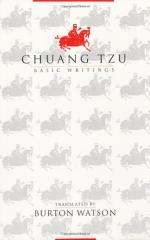|
This section contains 7,754 words (approx. 26 pages at 300 words per page) |

|
SOURCE: Chenyang Li. “What-Being: Chuang Tzu Versus Aristotle.” International Philosophical Quarterly 33, no. 131 (September 1993): 341-53.
In the following essay, Chenyang Li examines the differing methods by which Chuang Tzu and Aristotle determine what something is.
In a way, the philosophy of Chuang Tzu (b. 369 b.c., China) is radically non-commonsensical. For instance, he says “nothing in the world is bigger than the tip of an autumn hair, and Mount T'ai is small.”1 Nevertheless, behind Chuang Tzu's willingness to depart from ordinary ways of talking, there is a metaphysics of everyday reality. The purpose of this paper is to compare Chuang Tzu's view of what an object is—its “what-being”—to a highly influential Western view that derives from Aristotle. I will show how Chuang Tzu's metaphysics is a plausible alternative to the Aristotelian philosophy.
I
A common view of being goes like this: an object2 falls into a certain...
|
This section contains 7,754 words (approx. 26 pages at 300 words per page) |

|


